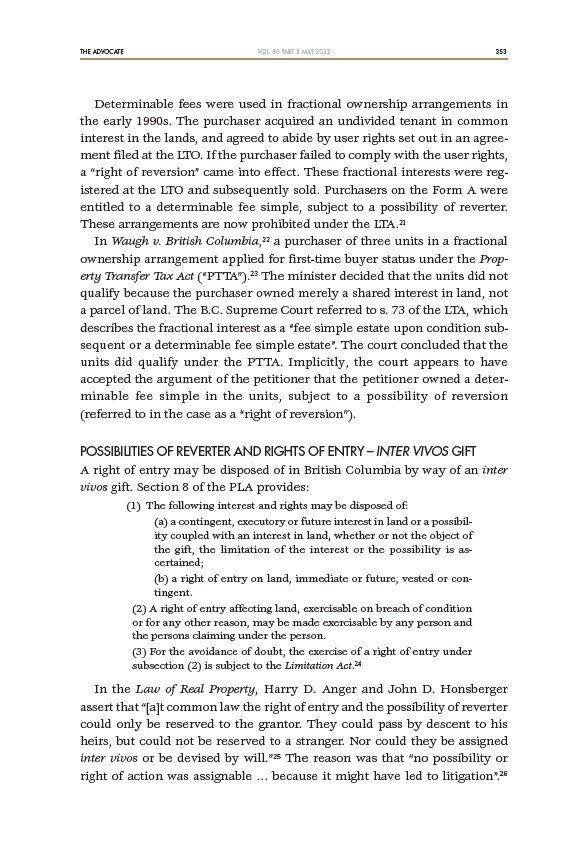
THE ADVOCATE 353
VOL. 80 PART 3 MAY 2022
Determinable fees were used in fractional ownership arrangements in
the early 1990s. The purchaser acquired an undivided tenant in common
interest in the lands, and agreed to abide by user rights set out in an agreement
filed at the LTO. If the purchaser failed to comply with the user rights,
a “right of reversion” came into effect. These fractional interests were registered
at the LTO and subsequently sold. Purchasers on the Form A were
entitled to a determinable fee simple, subject to a possibility of reverter.
These arrangements are now prohibited under the LTA.21
In Waugh v. British Columbia,22 a purchaser of three units in a fractional
ownership arrangement applied for first-time buyer status under the Property
Transfer Tax Act (“PTTA”).23 The minister decided that the units did not
qualify because the purchaser owned merely a shared interest in land, not
a parcel of land. The B.C. Supreme Court referred to s. 73 of the LTA, which
describes the fractional interest as a “fee simple estate upon condition subsequent
or a determinable fee simple estate”. The court concluded that the
units did qualify under the PTTA. Implicitly, the court appears to have
accepted the argument of the petitioner that the petitioner owned a determinable
fee simple in the units, subject to a possibility of reversion
(referred to in the case as a “right of reversion”).
POSSIBILITIES OF REVERTER AND RIGHTS OF ENTRY – INTER VIVOS GIFT
A right of entry may be disposed of in British Columbia by way of an inter
vivos gift. Section 8 of the PLA provides:
(1) The following interest and rights may be disposed of:
(a) a contingent, executory or future interest in land or a possibility
coupled with an interest in land, whether or not the object of
the gift, the limitation of the interest or the possibility is as-
certained;
(b) a right of entry on land, immediate or future, vested or contingent.
(2) A right of entry affecting land, exercisable on breach of condition
or for any other reason, may be made exercisable by any person and
the persons claiming under the person.
(3) For the avoidance of doubt, the exercise of a right of entry under
subsection (2) is subject to the Limitation Act.24
In the Law of Real Property, Harry D. Anger and John D. Honsberger
assert that “at common law the right of entry and the possibility of reverter
could only be reserved to the grantor. They could pass by descent to his
heirs, but could not be reserved to a stranger. Nor could they be assigned
inter vivos or be devised by will.”25 The reason was that “no possibility or
right of action was assignable … because it might have led to litigation”.26